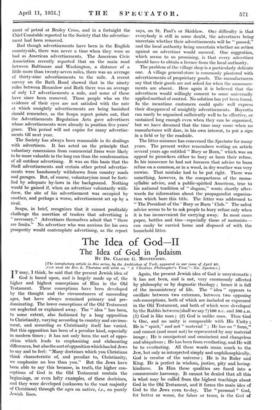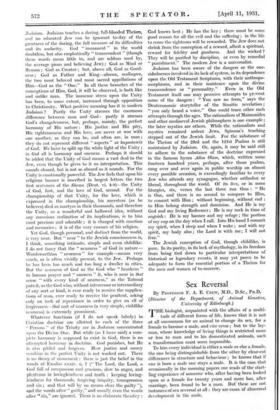The Idea of God—II
The Idea of God in Judaism
BY DR. CLAUDE G. MONTEFIORE.
[The introductory article in this series, by the Archbishop of York, appeared in our issue of April 4th. iVext week the Rev. L. Thornton will write on " A Christian Philosopher's View."—ED. Spectator.]
IT may, I think, be said that the present Jewish idea of God is based upon, and is largely made up of, the higher and highest conceptions of Him in the Old Testament. These conceptions have been developed by the thought and the circumstances of succeeding ages, but have always remained primary and pre- dominating. The lower conceptions of the Old Testament are neglected or explained away. The " idea " has been, to some extent, also fashioned by a long opposition to Christianity, varying according to country and environ- ment, and according as Christianity itself has varied. But this opposition has been of a peculiar kind, especially in modern times ; it has not only been the sort of oppo- sition which leads to emphasizing and elaborating differences, but also the sort of opposition which has led Jews to say and to feel: "Many doctrines which you Christians think characteristic of, and peculiar to, Christianity, we emphasize no less than you." But the Jews have been able to say this because, in truth, the higher con- ceptions of God in the Old Testament contain the beginnings, or even lofty examples, of these doctrines, and they were developed (unknown to the vast majority of Christians) through the ages on native, i.e., on purely Jewish lines. Again, the present Jewish idea of God is unsystematic ; it has not been, and is not, very enormously affected by philosophy or by dogmatic theology ; hence it is full of the inconsistency of life. The " idea " appears to oscillate between two extremes, between two opposing sub-conceptions, both of which are included or expressed in the Old Testament, and both of which were developed by the Rabbis between (shall we say ? ) 100 B.C. and 500 A.D. (1) God is like man ; (2) God is unlike man. Thus God is One, and no unity is comparable with His Unity ; He is " spirit," and not " material " ; He has no " form," and cannot (and must not) be represented by any material image ; He is omnipotent and omniscient and changeless and ubiquitous ; He has been from everlasting, and He will be to everlasting. All these words mean much to the Jew, but only as interpreted simply and unphilosophically. God is creator of the universe ; He is its Ruler and King. He is perfect in wisdom, justice, pity and loving- kindness. In Him these qualities are fused into a consummate harmony. It cannot be denied that all this is what may be culled from the highest teachings about God in the Old Testament, and it forms the main idea of God to the Jews even to-day. The " personal " God, for better or worse, for falser or truer, is the God of Judaism. Judaism teaches a daring, full-blooded Theism, and no educated Jew can be ignorant to-day of the greatness of the daring, the full measure of its difficulties and its audacity. God " immanent " in the world doubtless, but also emphatically " transcendent " (though these words mean little to, and are seldom used by, the average pious and believing Jew) ; God as Mind or Reason ; God as Creator ; but, above all, God as Good- ness ; God as Father and King—abeenu, malkaynu, the two most beloved and most sacred appellations of Him—God as the " One." In all these branches of the conceptions of Him, God, it will be observed, is both like and unlike man. The immense stress upon the Unity has been, to some extent, increased through opposition to Christianity. What positive meaning has it in modem Judaism ? Partly the Unity stresses the enormous difference between man and God : partly it stresses God's changelessness, but, perhaps, mainly, the perfect harmony of His nature : His justice and His pity, His righteousness and His loVe, are never at war with one another, as they can be, and often are, in man ; they do not represent different " aspects " or hupostaseis of God. We have to split up the white light of the Unity ; in God all is harmony and oneness. Perhaps it should be added that the Unity of God means a vast deal to the Jew, even though he gives to it no interpretation. This sounds absurd, but is not so absurd as it soUnds. For the Unity is emotionally powerful. The Jew feels that upon his religious banner is inscribed in largest letters the two first sentences of the Shema (Dent. vi. 4-9)—the Unity of God, first, and the love of God, second. For the championship of that Unity, for the love, which is expressed in the championship, his ancestors (as he believes) died as martyrs in their thousands, and therefore the Unity, as a wonderful and hallowed idea, without any conscious realization of its implications, is to him most precious and adorable ; it is charged with emotion and memories ; it is of the very essence of his religion.
Yet God, though personal, and distinct from the world, is very near. But " near " to the Jewish consciousness is, I think, something intimate, simple and even childlike. I do not fancy that the " nearness " of God in nature- Wordsworthian " nearness " for example—means very much, or is often vividly present, to the Jew. Perhaps he has been too much and too long a dweller in cities. But the nearness of God as the God who " hearkens " to human prayer and " answers " it, who is near in that sense " with every kind of nearness," as the Talmud piitS it, as the God who, without intercessor or intermediary of any sort or kind, is ever ready to receive the supplica- tions of man, ever ready to receive the penitent, asking only an inch of repentance in order to give an ell of forgiveness—that sort of nearness (a very simple, childlike nearness) is extremely prominent.
Whatever functions (if I do not speak falsely) in Christian doctrine are allotted to each of the three " Persons " of the Trinity are in Judaism concentrated Upon the Divine One. But while (as I have said) a com- plete harmony is supposed to exist in God, there is no attempted harmony in doctrine. God punishes, but He is also pitiful and forgives. How justice and mercy combine in the perfect Unity is not worked out. There is no theory of 'atonement : there is just the belief in the words of Exodus xxxiv. 6, 7 (" The Lord, the Lord, a God full of compassion and gracious, slow to anger, and plenteous in lovingkindness and truth : keeping loving- kindness for thousands, forgiving iniquity, transgression and sin ; and that will by no means clear the guilty "), and the words after " guilty," and usually even the wordi after " sin," are ignored. There is no elaborate theodiey : God knows best ; He has the key ; there must be some good reason for all the evil and the suffering ; in the life to come the righteous will be rewarded. The Jew does not shrink from the conception of a reward, albeit a spiritual, reward for fidelity and goodness. And the wicked ? They will be purified by discipline, or even by remedial " punishment." The modern Jew is a universalist.
Judaism has been aware of the dangers or the one- sidednesses involved in its lack of system, in its dependence upon the Old Testament Scriptures, with their anthropo- morphisms, and in their insistence upon the divine transcendence or " personality." Even in the Old Testament itself one may perceive attempts to pnvent some of the dangers :" " You saw no form," says the Deuteronomic storyteller of the Sinaitic revelation ; " you only heard a *voice." One could trace other such attempts through the ages. The rationalism of Maimonides and other mediaeval Jewish philosophers is one example ; the later mystics are others. While the rationalists and mystics remained ardent Jews, Spinoza's teaching stepped out of the Jewish limit. For the substance of the Theism of the 23rd and the 121st Psalms is still maintained by Judaism. Or, again, it may be said still to adhere to the substance of the doctrine expressed in the famous hymn Adon Olam, which, written some fourteen hundred years, perhaps, after those psalms, sung over and over 'again in public worship on almost every possible occasion, is exceedingly familiar to every Jew who attends any synagogue, whether orthodox or liberal, throughout the world. Of its five, or in some liturgies, six, verses the last three run thus : " He is One, and there is no second to compare to Him, to consort with Him ; without beginning, withOut end : to Him belong strength and dominion. And He is my God and my living Redeemer ; He is my rock in time of anguish : He is my banner and my refuge ; the portion of my cup on the day when I call. Into His hand I commit my spirit, when I sleep and when I wake ; and with my spirit, my body also ; the Lord is with me; I will not fear."
The Jewish conception of God, though childlike, is pure. In its purity, in its lack of mythology, in its freedom from being tied down to particular interpretations of historical or legendary events, it may yet prove to be adequate to form the essential portion of a Theism for the men and women of to-morrow.











































 Previous page
Previous page